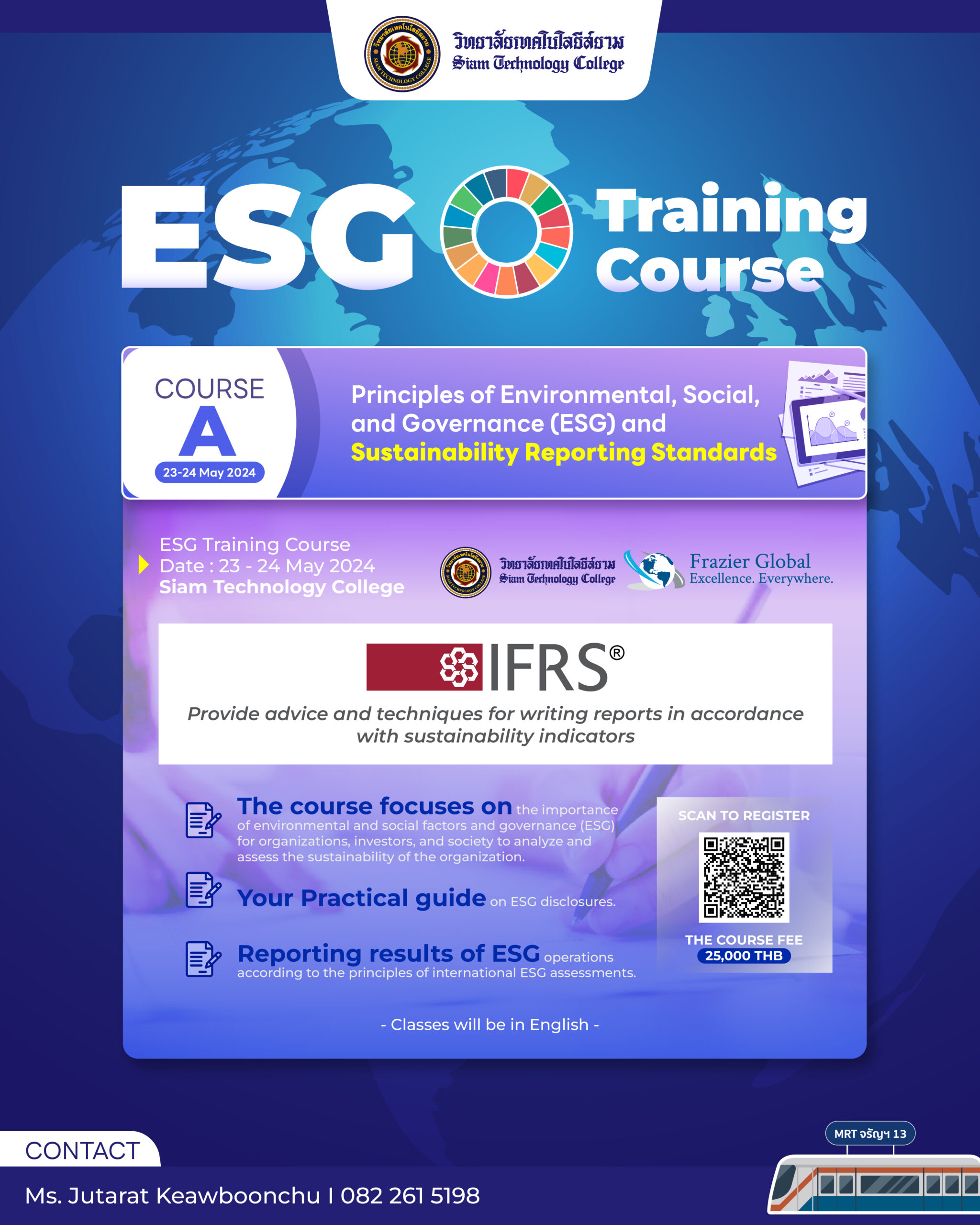Principles of Environmental, Social, and Governance (ESG) and Sustainability Reporting Standards
ราคา - บาท.
วันที่
–
เวลา
–
แนวคิดของหลักสูตร :
หลักสูตร หลักการดำเนินการด้านสิ่งแวดล้อม สังคม และการกำกับดูแลกิจการ (ESG) และมาตรฐานการจัดทำรายงานความยั่งยืน Principles of Environmental, Social, and Governance (ESG) and Sustainability Reporting Standards เป็นหลักสูตร 8 สัปดาห์หรือหลักสูตรระยะสั้นสองวัน โดยเน้นความสำคัญในปัจจัยด้านสิ่งแวดล้อม สังคม และธรรมาภิบาล (ESG) เพื่อสร้างมูลค่าให้กับองค์กร นักลงทุน และสังคม นักศึกษาและผู้ประกอบวิชาชีพ หลักสูตรจะเจาะลึกในขั้นตอนที่เกี่ยวกับการรวบรวม การวิเคราะห์ การวัดผล และการเปิดเผยข้อมูลการดำเนินงานผ่านแนวคิด ESG ภายใต้หลักสูตรนี้ นักเรียนจะพัฒนาความรู้และความเข้าใจครอบคลุมหัวข้อ ESG และความยั่งยืน นักเรียนสามารถนำประเด็น ESG ไปใช้อย่างเกิดประสิทธิผลเพื่อประกอบการตัดสินใจทางการเงิน นอกจากนี้ หลักสูตรยังมุ่งเน้นเกี่ยวกับการวิเคราะห์ และประเมิน การใช้ข้อมูลและเทคโนโลยีสำหรับแนวคิด ESG ในการรวบรวม วัด และรายงานข้อมูลขององค์กร
หลักสูตรนี้ยังให้ความสำคัญกับแนวคิดการเปิดเผยข้อมูล ESG และบทบาทที่สำคัญในการดำเนินงานทางธุรกิจ โดยลักษณะของการเปิดเผยที่มีคุณภาพสูง ๆ โดยให้ตัวอย่างของกรอบการรายงานที่เป็นที่นิยมระหว่างนักลงทุนและสาธารณะ ยกตัวอย่างเช่น ISSB, SASB และ GRI เป็นต้น นอกจากนี้ นักศึกษาจะมีความเข้าใจเกี่ยวกับแนวโน้มที่เกี่ยวข้องกับกฎระเบียบและรายงาน ESG ที่กำลังดำเนินการในปัจจุบัน หลักสูตรนี้จะเน้นที่วิธีการอ่านและวิเคราะห์ข้อมูล ESG และทำให้นักศึกษาเข้าใจวิธีการประเมินความเสี่ยงและโอกาสที่เกี่ยวข้องกับ ESG สามารถเปรียบเทียบและวิเคราะห์การเปิดเผยข้อมูล ESG ขององค์กรได้ ทราบถึงวิธีที่ผู้มีส่วนได้ส่วนเสียประเมินความเสี่ยงและโอกาสทาง ESG นอกจากนี้ นักศึกษายังจะได้รับโอกาสในการศึกษาเปรียบเทียบข้อมูลการเปิดเผย ESG ของบริษัทหลายๆ แห่งด้วยข้อมูลที่เปิดเผยแบบสาธารณะในปัจจุบัน
โดยรวมแล้ว หลักสูตรนี้มุ่งเน้นให้ผู้เรียนมีความรู้ความเข้าใจเกี่ยวกับหลักการ ESG และความสำคัญในการตัดสินใจขององค์กรและนักลงทุนและการรายงานความยั่งยืน
ระยะเวลาของหลักสูตร :
หลักสูตรระยะสั้นแบบเร่งรัดสองวันหรือหลักสูตร 8 สัปดาห์
กลุ่มเป้าหมาย :
นักศึกษาระดับปริญญาตรี บัณฑิตศึกษา ผู้เชี่ยวชาญด้านองค์กร และผู้ที่มีความสนใจเข้าร่วม
วัตถุประสงค์ของหลักสูตร
ตารางเวลาเบื้องต้นสำหรับหลักสูตร
Sec. | Time | Topic | Materials & Activities | Evaluation | Lecturer (s) |
Module 1 : Introduction to ESG & Sustainability – What is ESG?
– Sustainable Development Goals (SDGs) – Key Reporting Standards and Frameworks – Responsible investment versus Corporate Management – Benefits of Sustainability Programs with ESG – Class Quiz & Discussion |
| ||||
Module 2 : Exploring the ESG Pillars – Diving deeper into ESG Risk and Opportunity Issues
– Class Quiz & Discussion | |||||
Module 3 : Carbon Offsets (insetting) – An introduction to climate change
| |||||
Module 4 : Carbon removal (nature-based solutions and technical) – Understanding materiality in ESG – Double Materiality – GRI vs ISSB
– Case Study on Defining Material Issue – Environmental, Social, Governance – SASB Sectors & Industries ESG Standards & Factors – Case Study on ESG integration – Class Quiz and Discussion | |||||
Module 5 : Tech, Data, and ESG – Role of Tech and Data – Why Important to invest in ESG data & technologies – ESG Reporting Frameworks – Practice Steps for ESG Data Integration | |||||
Module 6 : Sustainability Accounting Standards and Guidance – Consolidation of Alphabet Soup of Accounting Standards and Frameworks – Types of ESG Information – The need for sustainability accounting standards – Evaluating the Comparability of Sustainability Information – The Connection Between Sustainability Performance and Valuation – Class Quiz and Discussion – Sustainability and ESG Report Homework | |||||
Module 7 : Carbon Accounting Standards – ISSB’s New Standards: S1 & S2 – IFRS Governance and Oversight Structure – Market Drivers for the ISSB – ISSB Objectives – IFRS Standards within the Broader Reporting Landscape – Architecture of the New Standards
– Class Quiz & Discussion | |||||
Module 8 : Stock Exchange of Thailand (SET) Guidance – Sustainability Disclosure Guidelines in the Thai Capital Market – Benefits of Sustainability Reporting – In Depth look into the Guide – ESG Metrics | |||||
Module 9 : ESG Reporting and Disclosure – Writing & Interpreting – ESG Report Case Examples – ESG Disclosures – Preparing for Disclosures – Form 56-1 One Report – ESG Ratings and Broader Ecosystem – Evaluation, Best Practices and Report Examples – Integrated Reporting – Greenwashing and Why it is Important to Avoid – Sustainability and ESG Reporting Assurance – Designing the Sustainability or ESG Report – Class Quiz and Discussion | |||||
Module 10 : Sustainability Report Review & Group Briefings – Sustainability Report Review and Discussion | |||||
Module 11 : Integrating ESG into Corporate Performance: A Practical Approach – Key Business Challenges linked to ESG performance target, reporting and disclosures – An Example Approach to Develop & Integrate an ESG Strategy | |||||
Module 12 : Key ESG Regulation and Policy Developments – Key ESG Regulation and Policy Developments
|

Siam Technology College
วิทยาลัยเทคโนโลยีสยาม
ติดต่อเรา
- 46 Charansanitwong Road Wat Tha Phra Subdistrict, Bangkok Yai, Bangkok 10600
- 02-878-5000
- info@siamtechno.ac.th
- www.siamtechno.ac.th


